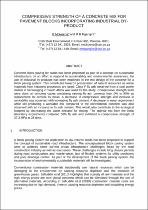 ResearchSpace
ResearchSpace
Compressive strength of a concrete mix for pavement blocks incorporating industrial by-product
JavaScript is disabled for your browser. Some features of this site may not work without it.
- ResearchSpace
- →
- Research Publications/Outputs
- →
- Conference Publications
- →
- View Item
| dc.contributor.author |
Mokoena, Refiloe

|
|
| dc.contributor.author |
Mgangira, Martin B

|
|
| dc.date.accessioned | 2018-01-12T09:57:31Z | |
| dc.date.available | 2018-01-12T09:57:31Z | |
| dc.date.issued | 2017-07 | |
| dc.identifier.citation | Mokoena, R. and Mgangira, M.B. 2017. Compressive strength of a concrete mix for pavement blocks incorporating industrial by-product. SATC 2017 - Southern African Transport Conference, CSIR ICC, Pretoria, 10-13 July 2017 | en_US |
| dc.identifier.isbn | 978-1-920017-73-6 | |
| dc.identifier.uri | http://www.satc.org.za/assets/1a_mgangira.pdf | |
| dc.identifier.uri | http://hdl.handle.net/10204/9951 | |
| dc.description | Paper delivered at SATC 2017 - Southern African Transport Conference, CSIR ICC, Pretoria, 10-13 July 2017 | en_US |
| dc.description.abstract | Concrete block paving for roads has been proposed as part of a concept on sustainable infrastructure. In an effort to respond to sustainability and environmental awareness, the use of industrial by-products has been employed in the mix design of the concrete for a block paving system. This contributes towards preservation of natural resources as waste materials from industrial processes are used. Class F fly ash obtained from a coal power station in Vereeniging in South Africa was used for the study. Compressive strength tests were done on concrete cubes containing varying fly ash contents from 0% to 90% as replacement for cement by mass. A decrease in compressive strength and increase in workability was observed with increasing fly ash content. A decrease in water requirement while still producing a workable mix compared to the conventional concrete was also observed with an increase in fly ash content. This would also contribute to the ecological footprint by decreasing the water demand for mixing. The optimal mix from the initial laboratory experiments contained 50% fly ash and exhibited a compressive strength of 37.3 MPa at 28 days. | en_US |
| dc.language.iso | en | en_US |
| dc.publisher | www.satc.org.za | en_US |
| dc.relation.ispartofseries | Worklist;19810 | |
| dc.subject | Biological Activator | en_US |
| dc.subject | Cement | en_US |
| dc.subject | Concrete mix | en_US |
| dc.subject | Fly Ash | en_US |
| dc.subject | Pavement blocks | en_US |
| dc.title | Compressive strength of a concrete mix for pavement blocks incorporating industrial by-product | en_US |
| dc.type | Conference Presentation | en_US |
| dc.identifier.apacitation | Mokoena, R., & Mgangira, M. B. (2017). Compressive strength of a concrete mix for pavement blocks incorporating industrial by-product. www.satc.org.za. http://hdl.handle.net/10204/9951 | en_ZA |
| dc.identifier.chicagocitation | Mokoena, Refiloe, and Martin B Mgangira. "Compressive strength of a concrete mix for pavement blocks incorporating industrial by-product." (2017): http://hdl.handle.net/10204/9951 | en_ZA |
| dc.identifier.vancouvercitation | Mokoena R, Mgangira MB, Compressive strength of a concrete mix for pavement blocks incorporating industrial by-product; www.satc.org.za; 2017. http://hdl.handle.net/10204/9951 . | en_ZA |
| dc.identifier.ris | TY - Conference Presentation AU - Mokoena, Refiloe AU - Mgangira, Martin B AB - Concrete block paving for roads has been proposed as part of a concept on sustainable infrastructure. In an effort to respond to sustainability and environmental awareness, the use of industrial by-products has been employed in the mix design of the concrete for a block paving system. This contributes towards preservation of natural resources as waste materials from industrial processes are used. Class F fly ash obtained from a coal power station in Vereeniging in South Africa was used for the study. Compressive strength tests were done on concrete cubes containing varying fly ash contents from 0% to 90% as replacement for cement by mass. A decrease in compressive strength and increase in workability was observed with increasing fly ash content. A decrease in water requirement while still producing a workable mix compared to the conventional concrete was also observed with an increase in fly ash content. This would also contribute to the ecological footprint by decreasing the water demand for mixing. The optimal mix from the initial laboratory experiments contained 50% fly ash and exhibited a compressive strength of 37.3 MPa at 28 days. DA - 2017-07 DB - ResearchSpace DP - CSIR KW - Biological Activator KW - Cement KW - Concrete mix KW - Fly Ash KW - Pavement blocks LK - https://researchspace.csir.co.za PY - 2017 SM - 978-1-920017-73-6 T1 - Compressive strength of a concrete mix for pavement blocks incorporating industrial by-product TI - Compressive strength of a concrete mix for pavement blocks incorporating industrial by-product UR - http://hdl.handle.net/10204/9951 ER - | en_ZA |





